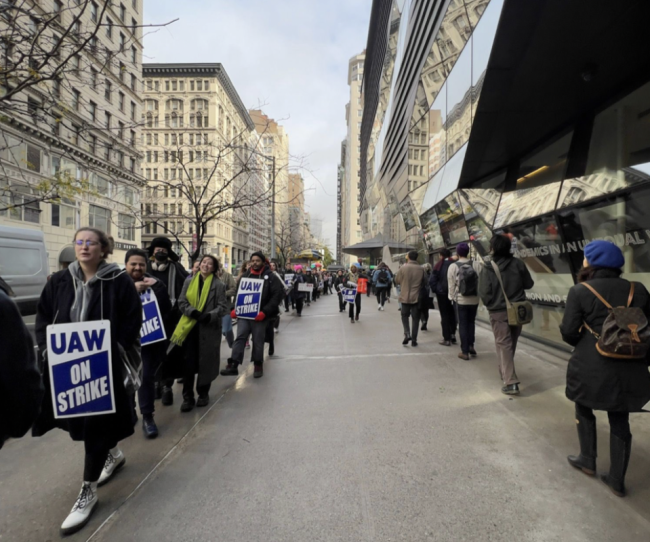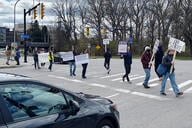You have /5 articles left.
Sign up for a free account or log in.

Adjuncts at the New School picket outside a campus building Wednesday.
Twitter/ACT-UAW Local 7902
Part-time faculty members at the New School, who are the vast majority of the university’s teaching force, walked out Wednesday to protest what they call administrative “intransigence” in contract negotiations.
The part-time faculty union, which is affiliated with the United Auto Workers, says members haven’t had a raise since 2018. The university has proposed a 3.5 percent wage increase, but this doesn’t address the fact that real earnings are down 18 percent since 2018 due to record inflation, nor does it address the work that instructors do work outside the classroom contact hours for which they’re paid, the union says.
The union’s contract expired earlier this month.
Part-time faculty pay at the New School varies, but some professors say they make around $4,000 per course. That's significantly less than some other area institutions pay: Barnard College recently increased its adjunct pay to $11,500 from $10,000 per seminar, and New York University bumped its per-course adjunct pay to $10,400. (Barnard and NYU adjuncts are represented by the UAW, as well.)
The New School doesn’t have the multibillion-dollar endowment that NYU has, but even less wealthy local institutions have improved adjunct faculty compensation in recent years. The City University of New York system agreed to pay adjuncts for up to 45 office hours per semester, depending on teaching load, in recognition of this nonclassroom work, for example. That’s on top of the per-course rate.
In addition to a meaningful pay increase, adjuncts at the New School are seeking two hours of paid nonteaching time per week per seminar, and one hour of paid nonteaching time for studio-style courses.
Compensation is at the core of the indefinite strike, which 97 percent of participating union members approved in a recent authorization vote. But the New School’s part-time professors also want more job security. Currently, professors who teach for 10 semesters can expect reappointment, but the union wants this service threshold lowered. Adjuncts also want assurances that the university won’t fail to rehire instructors who are just about to reach the reappointment stage, so as to avoid this commitment.
Other union wants include stronger protections against harassment and more say in the curriculum.
The New School said in a statement that it bargained with the union for 10 hours Tuesday and that it was “disappointed” that the strike proceeded. “Regardless,” the university said, “we are encouraged that the union has agreed to continue bargaining on Thursday and Friday this week and indicated a willingness to agree to mediation to break any impasses and help get an agreement in place. We believe strongly that a mediator’s support can help resolve these negotiations quickly.”
The university also said it’s “committed to ensuring that [the strike] creates as little disruption for our students and community as possible,” though many classes were called off Wednesday as instructors picketed outside campus buildings.
Adjuncts say they’re open to mediation, per the university’s proposal—with a big caveat.
“We wanted to get closer to something and then bring a mediator in,” said Jaclyn Lovell, a longtime instructor of writing at the New School who is on the bargaining team and makes about $6,000 per course. “We just were like, ‘We’re way too far apart. We’re so far apart.’”
Zoe Carey, a Ph.D. candidate in sociology at the New School and president of the UAW chapter representing adjuncts, student workers and health-care workers there, said teaching at the New School “is really a labor of love, because nobody, nobody would do this for what the New School is offering in terms of pay. But at some point you have to say enough is enough.”
Graduate assistants, postdoctoral fellows and academic researchers across the University of California system also held protests on their campuses Wednesday as part of a massive strike that began earlier in the week over stalled contract negotiations across four unions affiliated with the UAW. As at the New School, compensation is a major concern for UC strikers in light of rising housing costs and inflation.
The UC system, too, has proposed mediation. But the UAW has signaled that this is unwelcome at this point in negotiations.
“At this point, the priority should be round-the-clock bargaining in good faith, as opposed to switching to a mediation process,” Rafael Jaime, local UAW president and Ph.D. student in English at the UC system’s Los Angeles campus said in a statement. “We remain willing and able to meet with the university on an ongoing basis to reach a resolution.”
Jaime also called on community members "to respect the picket line by canceling all meetings and events on UC campuses. There will be no business as usual unless UC stops its unlawful conduct, commits to round-the-clock bargaining, and reaches fair agreements."





